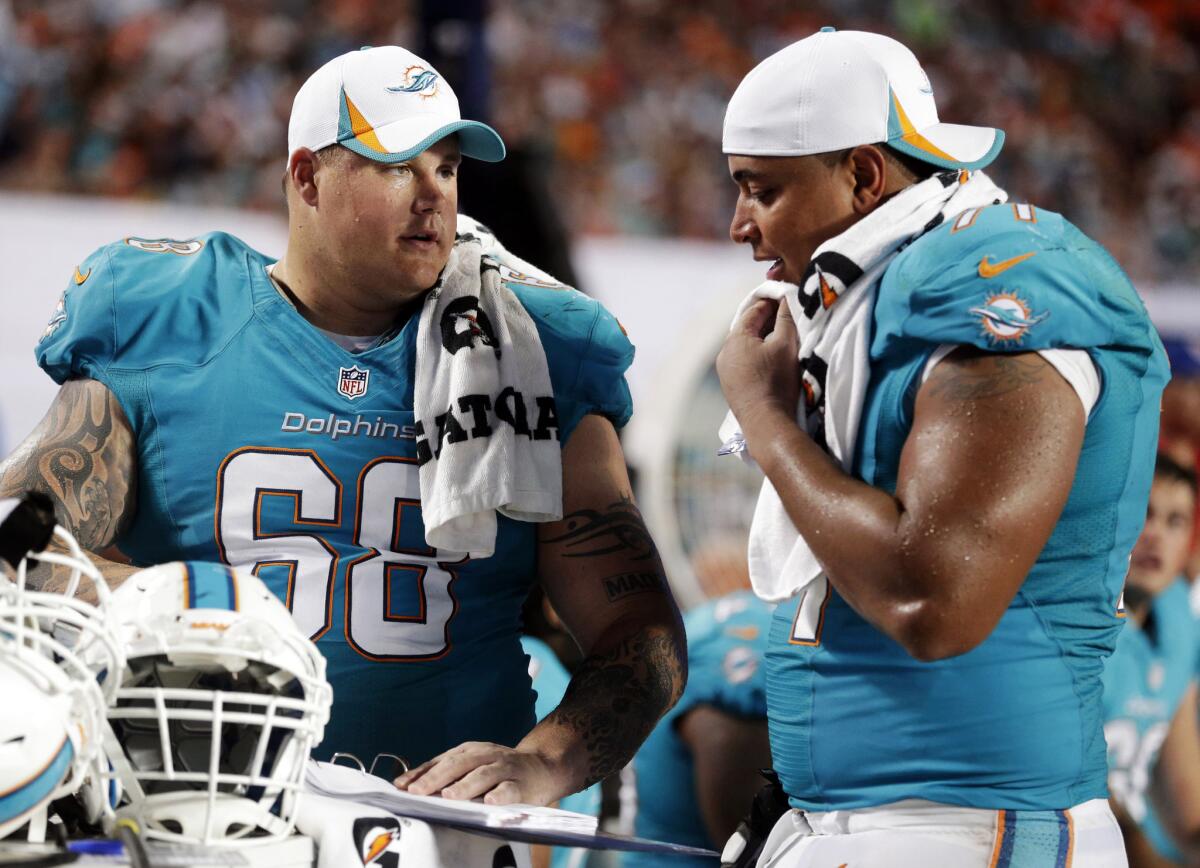Just as we thought: Richie Incognito bullied Jonathan Martin

- Share via
If you have any interest in the complex and nuanced dynamics of workplace bullying and harassment, you must sit down with the newly released report about what, exactly, happened in and out of the Miami Dolphins locker room that led Jonathan Martin to walk away from the team halfway through the season last year.
The 144-page report is a masterpiece of evenhandedness, produced by a team of attorneys led by Ted Wells, whose New York litigation firm was retained by the NFL to investigate the circumstances around Martin’s departure and his subsequent accusations against his teammates. His primary tormentor was fellow offensive lineman Richie Incognito, who is white, though the report also implicates two other starters -- John Jerry, who is black, and Mike Pouncey, who is biracial -- calling all three “equal-opportunity harassers.” Martin is black.
Even with its caveats about how locker rooms are different from other workplaces, and how private exchanges never meant for public consumption look much worse when taken out of context, the investigators recount so many reprehensible incidents that I guarantee you’ll will need some time to uncurl your toes.
Wells and his team had access to thousands of text messages among teammates and also to exchanges between Martin and his parents. They interviewed teammates, coaches, trainers and front-office executives. Incognito, of course, maintained that his antics were all in good fun, meant to inspire trust in teammates and toughen up a sensitive player.
But the harassment of two other Dolphin personnel -- one unidentified player who was repeatedly harassed with gay slurs, and a trainer -- led the attorneys to conclude that Martin did not make up his claims after the fact because he couldn’t hack professional football, as Incognito had claimed.
So what incidents did the investigators uncover?
Incognito repeatedly subjected Martin to sexually violent “jokes” about his mother and sister verbally and in texts. Incognito repeatedly used the n-word, and other racial slurs, such as “dirty Pakistani” to refer to Martin, including on the day that Martin left the team.
Incognito physically attacked Martin at a party, though not viciously enough to leave bruises or injuries, the investigators found.
A Japanese-born trainer, who was fearful of losing his job if he spoke up, was frequently subjected to racist slurs and was especially abused by Incognito, Jerry and Pouncey on Pearl Harbor Day.
In an exchange with an unidentified white former teammate, Incognito joked about purchasing gun sights that were “perfect for shooting black people.”
(“We accept that these messages are nothing more than thoughtless banter with no underlying malicious intent,” wrote the investigators. “But such jokes are nonetheless reprehensible and arguably reflect deep-seated racial hostility.”)
The investigators acknowledged that Martin’s history of depression, suicidal thoughts and his victimization by bullies as a teenager might have made him more susceptible to the abuse. And, they noted, he had a friendship with Incognito, described as “bipolar” and “odd, but seemingly close.”
But they concluded that Martin’s friendship with Incognito and his own vulgar and inappropriate banter was consistent with “the behavior of a victim of abusive treatment.” It was, they said, an attempt to fit in, something he did “with the hope of reducing the treatment he found offensive.”
“Further,” they added, “Martin’s vulnerabilities do not excuse the harassment that was directed at him. That the same taunts might have bounced off a different person is beside the point. Bullies often pick vulnerable victims, but this makes their conduct more, not less, objectionable.”
It would have been better, investigators said, had Martin taken his complaints to the team’s head coach, Joe Philbin, who was unaware of the misconduct, and allowed the matter to be handled internally, rather than let it explode in the media. On the other hand, they acknowledged, the team had a “Judas court,” apparently led by Incognito, where players deemed disloyal were subjected to fines and harassment.
Martin, a Stanford-educated, two-time All-American offensive lineman, may still have a bright career ahead of him if he chooses to stay in the game, the report noted. In November, he was placed on the Dolphins non-football injury list with full pay. His contract does not expire until 2015.
Incognito was suspended with pay in December and will become a free agent next month.
“The behavior that occurred here was harmful to the players, the team and the league,” the report concluded. “There are lines -- even in a football locker room -- that should not be crossed, as they were here.”
Football lovers will probably debate this case for years to come. But Martin, whatever his fate, deserves our thanks. Good for him for bringing this sordid, unacceptable behavior to light.
[For the record, 3 p.m. PST Feb. 14: An earlier version of this post said Martin was a rookie in 2013. He was in his second NFL season. It also referred to Martin and Incognito as defensive players. They are offensive linemen.]
ALSO:
robin.abcarian@latimes.com
Twitter: @robinabcarian
More to Read
Go beyond the scoreboard
Get the latest on L.A.'s teams in the daily Sports Report newsletter.
You may occasionally receive promotional content from the Los Angeles Times.











